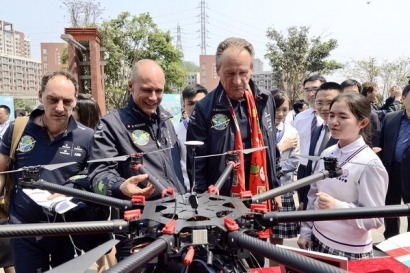
The fifth leg of the epic journey occurred Sunday, March 29, when the Solar Pulse took off from Mandalay, Myanmar and flew to the Chinese mega-city of Chongqing.
Bertrand Piccard flew the zero-fuel airplane for 20 hours and 29 minutes to make the leap to Chongqing, which has 28.8 million residents and is China's most populous city.
Given the size of the city, and the challenges associated with such density, the Solar Impulse team described their visit as "an amazing opportunity" to spread the renewable energy message.
While making appearances in China, the flight's team is being accompanied by representatives of Schindler, the global elevator company that established China's first industrial joint venture in 1980.
Together with Schindler's people, the Solar Impulse team will present the latest clean and green technology to the public, as well as Chinese developers, architects, urban designers and planners.
According to the Solar Impulse team, the craft's landing in China was challenging and delayed not only because of strong winds but also because of the intense traffic of Chongqing International Airport.
Upon landing, Piccard declared that managing to land in such difficult conditions was extremely reassuring in view of the numerous more challenges that the pilots will face in the next flights of the round-the-world tour.
For additional information:

